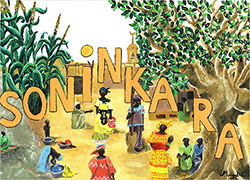My Brothers all, Idipro, Cisse, Nas, Lamezo and all other participants,
I know my thesis is rather provocative but it is not meant to be an attack on Islam; it is an attempt to deal with a crucial element of culture, that, in my mind, we have failed to understand well. Can we start afresh?
When we talk of Sooninke culture, what are we talking about? What are the elements of Sooninke culture? Can we isolate the individual components of this particular culture that we call Sooninke culture? Nas introduced a very important topic for all to consider (it is quoted above) and I am very glad that my good Brothers Idipro, Cisse, Nas, Lameno, et al... are all participating diligently and intelligently.
Now, can we approach this vital subject from a fresh angle, share our understanding of what Sooninke culture actually is. From this we can proceed.
I am particularly interested in this subject because I am a Diaspora Sooninke. By that I mean, I have never spent but a few days in a Sooninke town or village. I grew up in a Mandingo town called Kombo Gunjuru, went to boarding school in a Mandingo town, left the Gambia shortly before my 24th birthday. Since then I have been all over Europe from Espana to Prague and then to the USA. You are the largest body of Sooninko that I have the honor of discussing this subject with ever in my life. It is crucial that we actually understood what this Sooninke culture is. Let us shed some brilliant lights on it to help us all to see it and understand it.
As I embarked on the study of culture, I have always tried to flesh out its components and see what the aggregate feels live and how well it enables its adherents to live vibrantly, sanely, healthily, and lovingly as well. Culture, like Life, is a rather difficult subject to define. You may be able to describe it very well, however, it often defies an accurate, all encompassing definition. It is like the question "what is Life?".
I shall here attempt to list some of the components of culture to start with.
I regard language as a component of culture.
I regard religion as a component of culture.
I regard how we dress as a component of culture.
I regard the foods we eat, how we grow them, how we process them, and how we cook them as components of culture.
I regard the whole field of courtship, marriage, and family as components of culture.
I regard what kinds of sports we develop and engage in as components of culture.
I regard architecture and the furnishings as components of culture.
I regard music and dancing as components of culture.
I regard the whole educational process as a component of culture.
I regard how we approach and apprehend reality as components of culture in so far as they program the human mind.
In short, how we see Life and how we live it, how we relate to each other, and the various modes of securing a livelihood, are all generally, culturally defined.
I regard the way the human mind is conditioned as a component of culture.
The socio-politico-economic processes are all largely defined by culture.
We can add as much as comes to mind and then try to flesh out how these components have been developed to see how the Sooninko developed their culture. When we all have a good sense of what Sooninke culture is, then, we can figure out how to live it or how to improve it and then live it at the same time.
I am not a westerner bashing Islam. I have spent many decades studying religion from the most ancient of recorded time to the present. I do have a deep understanding of the role of religion in human Life and how it conditions the human mind. Brothers all, never take my critique of organized religion to mean that I hate Islam or hate religion. It is the vital essence of Social Life and it is our responsibility to thoroughly understand religion so that we can know when it is failing us or when we are failing it and then determine the reasons why.
Can we start afresh, in good spirits, a healthy dose of humor, and in lovely care for each other in order that we may understand the subject matter-SOONINKE CULTURE.
Idipro, thanks for your loving critiques. I hope you will continue to help out in this dialogue.
Good night all.
P/S: Brother Idipro, this Sooinike does not eat meat or fish or escargot. As a vegetarian, he does eat a lot of Molle for his proteins. He happens to do well with it. Laugh!!! Your points and remarks are all well taken and in love. Thanks. Let us go step by step and see where the dialogue takes us. We can far when we start near!!!

Affichage des résultats 1 à 10 sur 67
Threaded View
- 28/06/2011, 05h46 #7

Discussions similaires
-
Que pensez vous du traçage des frontières entre les différents pays de peuple soninké
By kagorota in forum De l'Origine des SoninkéRéponses: 13Dernier message: 15/01/2012, 23h48 -
Que pensez-vous
By sumbunu in forum SénégalRéponses: 9Dernier message: 03/10/2011, 16h02 -
la 3eme generation...quel avenir pour notre culture?
By abdoul gandega in forum CultureRéponses: 18Dernier message: 28/03/2008, 16h07 -
Que Pensez-vous De Ce 1er Gouvernement ?
By papisko12 in forum PolitiqueRéponses: 19Dernier message: 19/06/2007, 15h18 -
avez vous lu le livre " LA GRANDE MUTATION", quand pensez-vous?
By Diana Soumaré in forum Littérature, CinémaRéponses: 6Dernier message: 01/09/2006, 22h05


 LinkBack URL
LinkBack URL À propos de LinkBacks
À propos de LinkBacks





 Réponse avec citation
Réponse avec citation